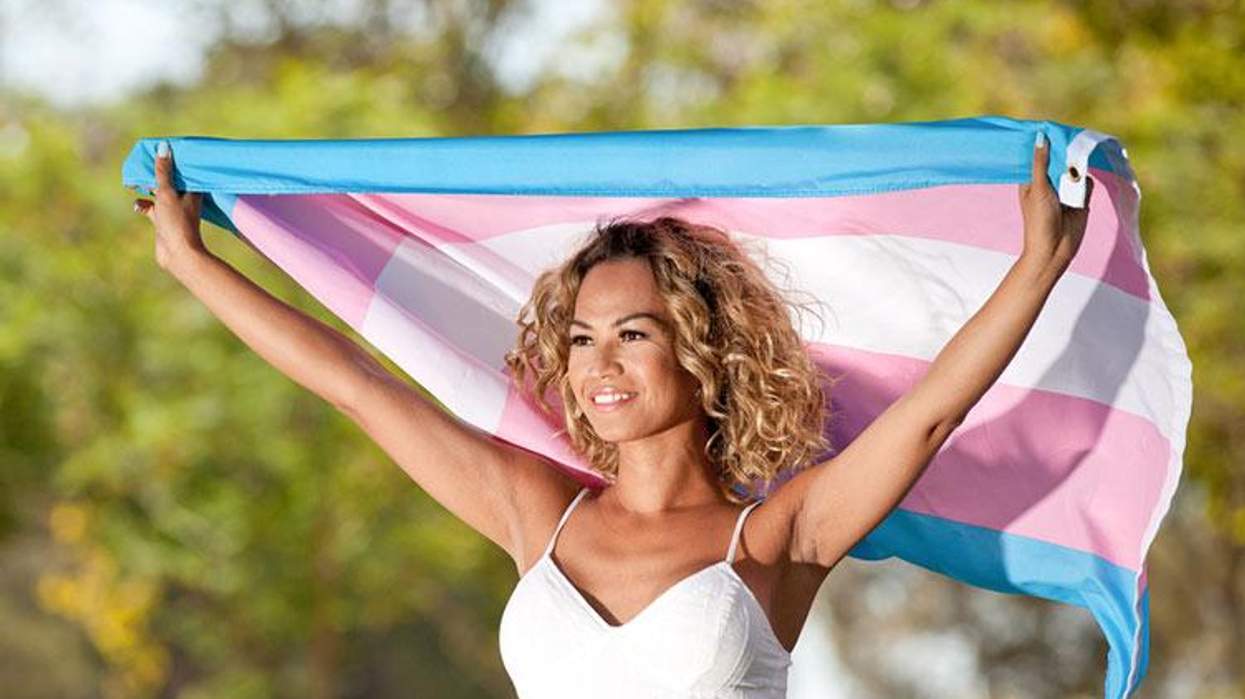I spent Saturday night in desperate need of a shower, trying to sleep sitting up on a bus. My feet are still sore, and my voice is hoarse. But I'm glad I went to the various protests surrounding Donald Trump's inauguration, including the Women's March on Washington, D.C.
The march was powerful. The organizers did an incredible job of lifting up the voices of women who are often pushed to the sidelines. But by the end of the day, I was left feeling sad -- shattered, really. Because while the Women's March made history, it left behind one of the world's most marginalized groups of women:
transgender women.
By my count, there were three trans women onstage during the six-hour program, which included more than 60 talented and notable speakers and performers. That's just two more trans women than were
featured at Donald Trump's inauguration. There were zero trans performers. There were no nonbinary or genderqueer trans people on the list of speakers.
With each minute that passed, as speaker after speaker took the stage without a single trans woman's voice, my heart sank. I felt like I was disappearing. I mentioned the fact that there had not been a trans woman onstage yet to the people around me. A kind but misguided cis woman attempted to reassure me. "One thing at a time, dear," she said.
The rally had been running for at least two hours before a trans woman spoke: the brilliant
Janet Mock, perhaps one of the best-known members of our community. But those two hours were painful, and nerve-racking for myself and other transfeminine people in attendance. I started getting texts from my friends, asking, "Are they going to have ANY trans women?!"
All movements struggle to avoid re-creating the systems of oppression they are trying to dismantle. Many elements of the women's movement for years have
excluded, marginalized, and contributed to societal violence against trans women. This reality led me and lots of trans people I know to feel apprehensive about attending the march, fearing that we would not be welcome or represented.
The exclusion and marginalization of trans women in "women's spaces" has real consequences. It contributes to the widespread belief that trans women are "really" men -- the very lie that catalyzes violence against trans women. We see this lie repeated in the pages of
The New York Times, in state legislatures passing anti-trans bathroom bills, and in the so-called "feminist"
briefs filed before the Supreme Court challenging the basic dignity of trans youths' lives.
To the organizers' credit, the Women's March's published
platform expresses support for trans women. Several speakers on the stage mentioned trans women during their speeches, but nearly always as a bullet point in a list or relegated to a letter among the "LGBTQ community."
There were some notable exceptions. Janelle Monae
stepped up with her call-and-response song mourning the deaths of those lost to racist and transphobic violence. Raquel Willis of the Transgender Law Center spoke fiercely about the history of our trans sisters--at least, before her mike
was cut prematurely.
I felt a little better each time someone acknowledged that trans people's lives matter. But as the hours passed, the pit in my stomach grew. I realized there were more cisgender men onstage than transgender women. And the people around me didn't notice. I wanted to cry.
Transgender women, especially trans women of color, face the
highest rates of violence and discrimination of all women. They are more likely to be attacked by the police and nearly twice as likely as others to face sexual assault. The majority of victims of hate-related homicides are trans women.
Cis and trans women face the same struggles. Our liberation is intertwined. Trans women's issues are women's issues: job and housing discrimination, street harassment, substandard health care, domestic violence, murder.
I have the utmost respect for the organizers of the Women's March. It was clear from the program that they put together that they were doing incredibly hard work to confront decades of racism, classism, Islamophobia, and heterosexism that have plagued many mainstream feminist campaigns. I also stand with them against the vile
attacks they've faced for their bravery.
But when it came to trans women, the march came up short. That doesn't mean the march was a failure. It doesn't mean we can't work in solidarity. But we can and must do better.
I walked away from the Women's March holding back tears. But I'm also holding hope. I am ready to fight tooth and nail for the liberation of all women. I ask the same of cisgender feminists as we prepare for the battles ahead.
 EVAN GREER is a transgender musician, speaker, and activist based in Boston. Follow her on Twitter at @evan_greer.
EVAN GREER is a transgender musician, speaker, and activist based in Boston. Follow her on Twitter at @evan_greer.

 EVAN GREER is a transgender musician, speaker, and activist based in Boston. Follow her on Twitter at @evan_greer.
EVAN GREER is a transgender musician, speaker, and activist based in Boston. Follow her on Twitter at @evan_greer.
Charlie Kirk DID say stoning gay people was the 'perfect law' — and these other heinous quotes